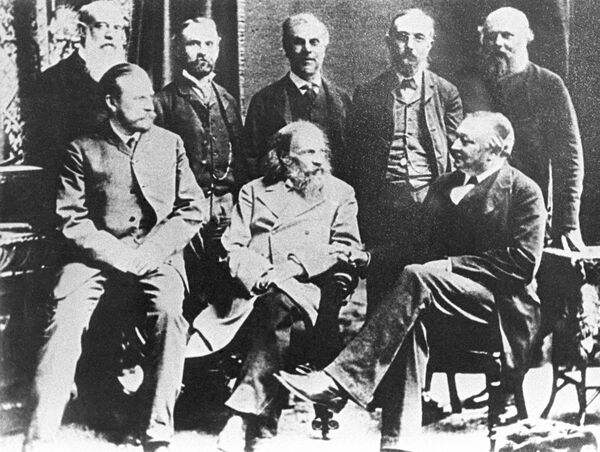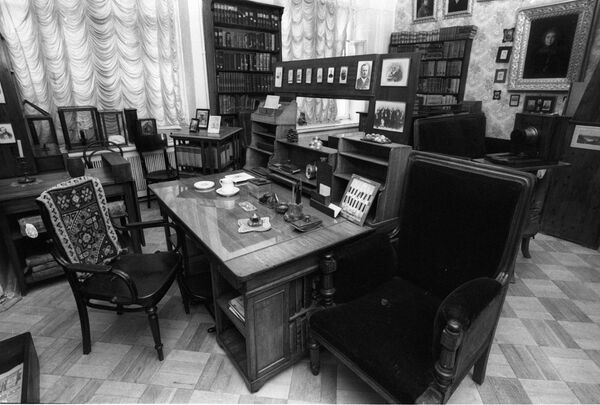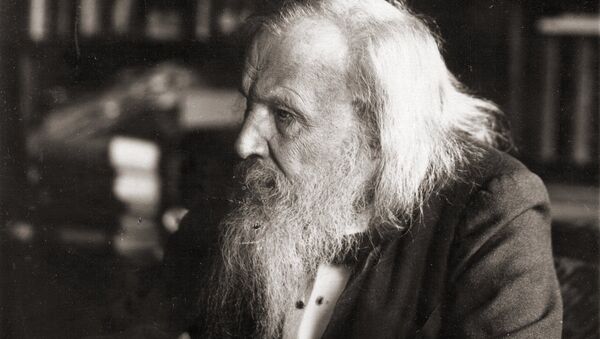Not everyone knows that besides being one of the greatest chemists in history, Mendeleev was also an expert in many other disciplines, including physics, economy, geology, meteorology and even an aeronautics, among other things. Here are a few other facts.
1. Born in a Very Large Family
Mendeleev was the 17th child in the family of Ivan Pavlovich Mendeleev, who was part of intelligentsia in the Siberian Region of Tobolsk. Unfortunately, young Dmitri had no chance to meet all of his siblings, as eight children died very young. Infant mortality in Siberia was high back in those days.
2. Bad Student
When young Mendeleev was in school, he wasn't the best student. On the contrary, he managed to fail a few of his classes and even had to repeat a whole year all over again due to unsatisfactory grades while at a pedagogical institute in St. Petersburg. His least favorite subjects at school were Latin and Bible Studies.
3. Suitcase Manufacturer
Among the residents of St. Petersburg, Mendeleev was also known as a master of suitcase making. Mendeleev's suitcases and travel bags were of excellent quality and highly valued among Russian merchants. His secret to making amazing suitcases was a special kind of glue, which Mendeleev discovered while studying different kinds of adhesive substances.
4. Inventor of Vodka
There is a popular myth that Mendeleev invented vodka. Well, that's not true, as the alcoholic drink had of course existed long before Mendeleev was even born. The myth that Mendeleev invented vodka was born after the scientist defended a dissertation on the combination of the pure form of alcohol with water. Mendeleev studied the ratio between alcohol and water, which caused the maximum decrease in the volume of the liquids mixed. He found it to be a solution with the mass fraction of alcohol equal to 46 percent. His dissertation had nothing to do with vodka or its invention.
5. Never Won Nobel Prize
Although Mendeleev was nominated to receive the Nobel Prize on three different occasions, he was never given the prize. Some argue that the main reason why Mendeleev wasn't given the Nobel Prize for his outstanding scholarly achievements was due to a conflict with the Nobel brothers.

6. Arctic Explorer
Everyone knows Mendeleev primarily as a chemist. However, Mendeleev devoted only 10 percent of his scholarly work to chemistry, while the rest of his time, the Russian scholar spent working on other things. For example, Mendeleev had a great interest in shipbuilding and the mastery of Arctic Maritime navigation about which he wrote over 40 scientific papers. Mendeleev was involved in the construction of the world's first Arctic icebreaker "Ermak," launched in 1898.
7. Up in the Air
Mendeleev worked on the development of flying machines with which he wanted to study temperature, air pressure and humidity in the upper atmosphere. In 1887, Mendeleev rose in the air up to 3,000 meters alone using one of the aerostat machines he helped to develop, a balloon with the volume of 700 m³. While in the air, the scientist measured air pressure and temperature and witnessed a solar eclipse, taking important scholarly notes. The French Academy of Aerostatic Meteorology awarded a medal of honor to Mendeleev for his flight in the balloon.
8. Dream About Periodic Table
There is another myth around Mendeleev, which says that the scholar invented his famous periodic table after he had seen it in a dream. The myth is really old and traces back to the time when Mendeleev was still alive. When Mendeleev was asked if the legend was true he said he had thought about the idea of a periodic table for 20 years day and night, adding that he couldn't believe some people thought he simply had a "divine" dream while sleeping and then the next day he came up with the whole periodic table.

9. Missing, but Not Unknown
When Mendeleev created his periodic table, he knew that the table still had gaps and some elements were missing. The scholar, however, predicted that in the future new elements would be discovered as a result of further studies and the use of more modern equipment than tools that the scholar had at his disposal at the time.
10. Oil Expert
Mendeleev was the first man to invent the modern forms of the transportation of bitumen and oil products using pipelines. The scholar recommended oil companies to transport oil not in carts and leather bags, but using storage tankers and pump oil through pipelines. Mendeleev carefully studied oil products and proved using data and numbers that oil-processing plants should be built in areas where petroleum products are consumed, instead of putting up factories near oil fields as oil companies initially had planned on doing.


